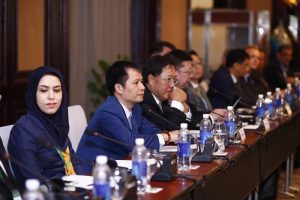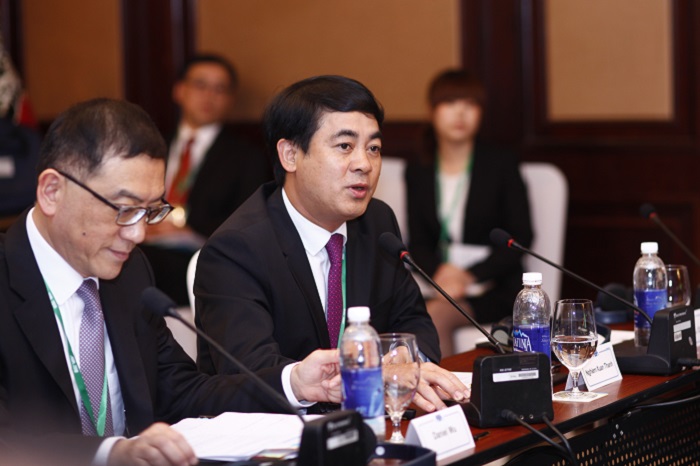More Inclusive Micro, Small and Medium Enterprise Financing for Banking Growth and Business Sustainability
- In the rapidly changing Asian economic environment, micro, small and medium businesses are acknowledged to be crucial for the growth and development of every country in Asia, both developing and developed. Furthermore, in the past, the two distinct sectors that were focused on by all key stake holders for growth and development were Micro and Small and Medium Enterprises (MSMEs).But today, the distinction between these two sectors are getting blurred and inter- relationship is becoming very significant.This is mainly due to the emergence of technology-savvy young people at the micro level and the rapid transition and graduation of micro entrepreneurs to small and medium levels compared with a decade ago. Every year in Asia, over 20 million micro and small businesses are emerging, with each one having fewer than five employees. In light of this, a more holistic, inclusive and integrated access to finance strategy is essential for a much broader area covering MSMEs.
- Capacity building for sustainable and successful enterprise creation at micro, small and medium level is vital for greater economic development and is needed for opening opportunities for the growth of the banking and finance industry in Asian countries. Making MSMEs commercially bankable is the key challenge faced by all stakeholders, and by providing financial inclusion, all would stand to benefit from their direct and indirect engagement. Although the role of banks and finance institutions essentially involves lending to commercially viable businesses, however, in terms of creating a pipeline of future business opportunities, they have a significant role to play in making these business entities commercially bankable through capacity building.
 In light of the huge potential offered by the MSME sector to the future of the banking industry in Asia, banks need to initiate more holistic and inclusive institutional linkages and partnerships to make MSMEs commercially bankable.
In light of the huge potential offered by the MSME sector to the future of the banking industry in Asia, banks need to initiate more holistic and inclusive institutional linkages and partnerships to make MSMEs commercially bankable.
- One such linkage is to build partnership between local business chambers and industry associations which are representative bodies of the individual MSMEs. These chambers and industry associations play a vital role in building the MSMEs that are their members.
- Second, it is important to create a linkage between MSMEs and the Micro, Small and Medium Professionals (MSMPs), particularly those in the areas of accounting and auditing, legal, process engineering, and marketing, among others. The MSMPs are professional individuals or small and medium institutions who also play a key role in making MSMEs more sustainable business entities, for whom banks can very comfortably create access to financial services.
- Third, for the business continuity and sustainability of MSMEs, partnership between value and supply chain entities are very significant and the banks need to facilitate and encourage these supply and value chain entities to create, on the other side of their client profile, a workable framework on buyback arrangements. This will mitigate the risk of lending to this sector to a considerable extent.
 With the MSME sector providing growing business opportunity for the banking industry in Asia, there is a need to take a strategic initiative of repositioning and evolving financial products, services and solutions that can match the emerging financial needs of this sector.
With the MSME sector providing growing business opportunity for the banking industry in Asia, there is a need to take a strategic initiative of repositioning and evolving financial products, services and solutions that can match the emerging financial needs of this sector.
- First, the banks have to identify key locations in their local areas where they need to make their financial services, solutions and products available to this sector.
- Second, there is a need for a proper assessment of the diverse financial services and solutions and having them appropriately tailor-made to create greater accessibility to the MSME sector.
- Third, unlike corporate or high net-worth financing, this sector can thrive on the concept of ‘millions to million’, which means offering financial services, solutions and product at affordable pricing and in a much larger scale which will enhance the ‘retail banking’ space. This is where banks have to invest in restructuring and evolving a strategic retail and development banking expertise and with proper risk assessment, risk mitigation and risk management professionals who have specific industry and sectoral knowledge.
- Providing financial services, solutions and products to the MSME sector offers a big business opportunity to banks and financial institutions in Asia. Achieving business sustainability of the next generation of banking depends on how fast the banking industry assess the financial needs of this sector and how rapidly they can evolve the appropriate products and solutions. The next generation of young entrepreneurs would emerge from the MSME sector. The technology-savvy young entrepreneurs would enrich the banks in the future, if the banking and finance solutions are made available, accessible and affordable at micro, small and medium levels. Today in Asia, the diversity of the MSME sector is widening, and in comparison with the more complex financial solutions demanded by the corporate and high net worth sector, MSMEs require straight-forward yet simple banking solutions.
 Recognizing the importance of this sector, more and more governments in Asia are putting in place much-needed legal framework and regulatory mechanisms to facilitate the empowerment of MSMEs. Furthermore, central banks in Asian countries are taking a proactive urging of commercial banks for greater commitment to the development of the MSME sector for business sustainability of the banking industry. In light of this, the prominent role that institutions such as the ABA can play in policy advocacy and in encouraging its member banks is greatly important in the current context. If the banking industry needs to blossom in the emerging frontier, where young technology-savvy entrepreneurs surface in numbers with innovative ideas and business solutions, it is in the MSME sector that banks are needed to capture that opportunity for their business continuity and sustainability.
Recognizing the importance of this sector, more and more governments in Asia are putting in place much-needed legal framework and regulatory mechanisms to facilitate the empowerment of MSMEs. Furthermore, central banks in Asian countries are taking a proactive urging of commercial banks for greater commitment to the development of the MSME sector for business sustainability of the banking industry. In light of this, the prominent role that institutions such as the ABA can play in policy advocacy and in encouraging its member banks is greatly important in the current context. If the banking industry needs to blossom in the emerging frontier, where young technology-savvy entrepreneurs surface in numbers with innovative ideas and business solutions, it is in the MSME sector that banks are needed to capture that opportunity for their business continuity and sustainability.
13 November 2015, Taipei

